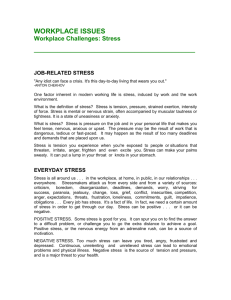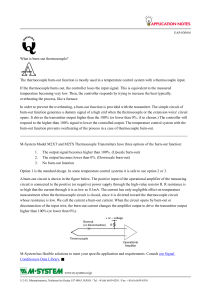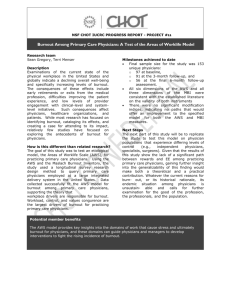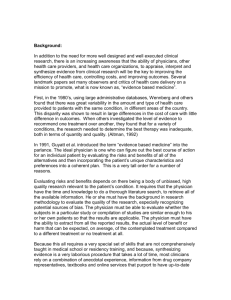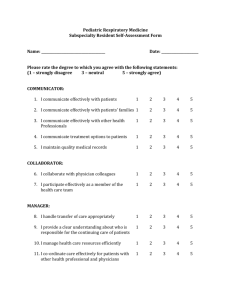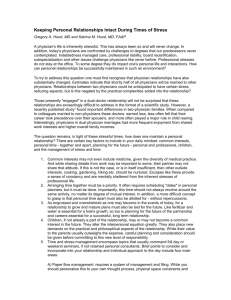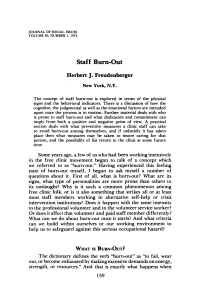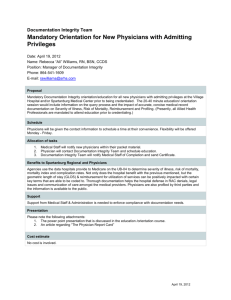What is Burn-out? - Medical Education | School of Medicine
advertisement
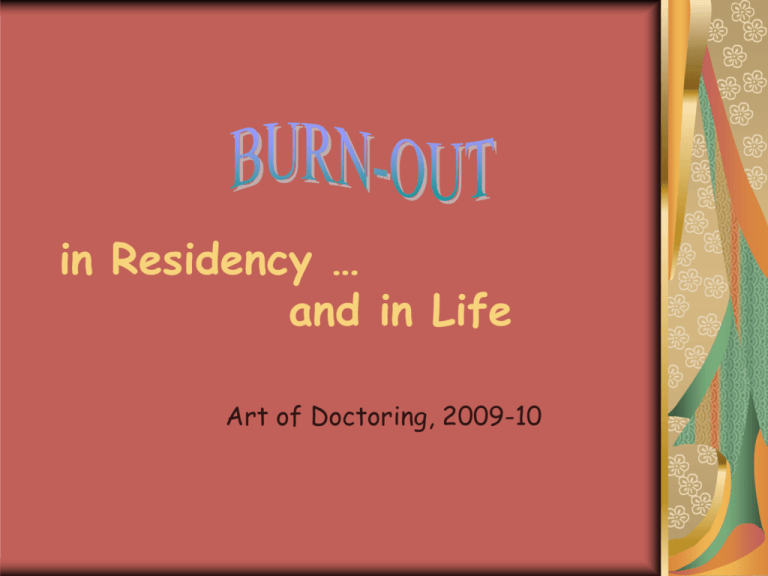
in Residency … and in Life Art of Doctoring, 2009-10 What is Burn-out? Emotional exhaustion – losing enthusiasm for work Depersonalization – treating people as objects Lowered sense of accomplishment – work is no longer meaningful Chronic irritability, negativity, and pessimism Burn-out is Widespread in Medicine 30-60% of specialists and general practitioners report burn-out 55-67% of physicians in private practice report burn-out Younger physicians have twice the burnout incidence of older colleagues At any given time, approximately 1 of every 3 physicians is experiencing burnout Professional Consequences of Burn-out Burnout alters both physician-patient relationship and quality of patient care Burnout/professional satisfaction related to physician empathy and compassion, prescribing habits, referral practices, professionalism, and likelihood of making medical errors Burnout also influences patient adherence to recommended therapy, degree of trust/confidence patients have in physician, patients' satisfaction with medical care Personal Consequences of Burn-out Depression, anxiety Divorce, broken relationships, and disillusionment Substance abuse, intent to leave medical practice, and suicide Are You at Risk for Burn-Out? Are you highly achievement-oriented? Do you tend to withdraw from offers of support? Do you have difficulty delegating responsibilities to others, including patients? Do you prefer to work alone? Do you avoid discussing problems with others? Do you tend to blame others? Are your work relationships asymmetrical; that is, are you always giving? Is your personal identity bound up with your work and professional identity? Do you often overload yourself – have a difficult time saying no? Have you lost your sense of hopefulness? Do you feel vulnerable all the time? Do you feel overwhelmed by unfinished personal business? Warning Signs of Burn-Out Abusing drugs, alcohol, or food Anger Blaming Chronic lateness Depression Diminished sense of personal accomplishment Exhaustion (physical and emotional) Excessively high self-expectations Hopelessness Inability to maintain balance of empathy and objectivity Increased irritability Less ability to feel joy Low self-esteem Workaholism SOURCES OF BURN-OUT Time pressures and intense professional commitment (workload) Lack of sleep Problematic relationships with peers Questions about professional competence Dealing with death and dying Dealing with medical mistakes Lack of motivated, grateful patients Bureaucratic burden Problems with work-life balance Responses to Burn-out Compromising work goals Blaming system or patients Giving up on humanistic beliefs about people Habitual complaining with peers Increasing emotional detachment from patients Isolation and emotional withdrawal Qualitative Study of Resident Burn-Out: Family Practice Residency, Santa Rosa Spheres of existence: work, education, and life outside medicine “In the course of the year, the original purpose of each sphere decomposed” Work Caring for patients Getting done Education Learning family medicine Mastering knowledge, procedures Outside life Maintaining quality Going through the motions Wait out Burn-Out? Belief that “things will get better” when the training period is over is a dangerous myth “Physicians who sacrifice their personal lives during training believe they will reap the rewards of a balanced life after graduation. Unfortunately, without skills to clarify and prioritize values or to develop a personal philosophy that integrates professional, personal, and spiritual domains, such balance does not easily occur” - T.E. Quill and P.R. Williamson, Healthy approaches to physician stress. Arch Intern Med 150 (1990), pp. 1857–1861 Don’t -at least not completely You hold onto the most important parts of who you are… Wellness strategies used by physicians Relationships Reducing isolation personally and professionally Be open with family and friends Share stories with colleagues you enjoy – don’t neglect emotional, existential aspects of being a physician Religious Beliefs/Spiritual Practice Religious observances Prayer, meditation Reading inspirational texts Renewal through nature Reconnecting with what provides joy and meaning Focusing on gratitude Self- and other-forgiveness Personal reflection Wellness strategies used by physicians Positive involvement with everyday practice Finding meaning in work Empowering yourself to make choices Look for ways to express creativity and involvement Manage schedule Discontinue unfulfilling aspects of work Practice being fully present with your patients (focus on the patient, rather than yourself) Accept the “gifts” your patients/colleagues/supervisors give you Rediscover medicine as a “calling” Look for awe and wonder in practice Wellness strategies used by physicians Self-Care Practices Exercise and healthy lifestyle habits Cultivate personal interests Cultivate self-awareness 15 minutes for self-reflection journaling Do something fun! Life Philosophy Positive outlook Identify and act on values Balance between personal/professional Remember you have options Don’t be a victim You always have choices Reach out for help (to colleagues, residency, family) Art of Doctoring can help! JAMA study 2009 Association of an educational program in mindful communication with burnout, empathy, and attitudes among primary care physicians. - Krasner MS, Epstein RM, Beckman H, Suchman AL, Chapman B, Mooney CJ, Quill TE.:1284-93. Training in appreciative inquiry, narrative medicine, and mindful meditation resulted in large, durable improvements in burnout, mood disturbance, and empathy. Night on Call - Rita Iovino, M.D. There are sometimes such moments of magic, when the sky and mountains melt into the dawn when the blue-purple horizon yields to the sun, and the trek home becomes a moment of epiphany. Everything is still and only the faint noise of sparrows permeates the air. The exhaustion and sweat and scrubs become an exclamation of rebirth. The gift of being a doctor is magnified like dandelions blowing in the wind, and one knows the skill of giving life, the gift of alleviating pain; the long night suturing becomes a dream because now one more person becomes whole by your latex gloves. The sun breaks into a million bright lights as you go home to sleep.
